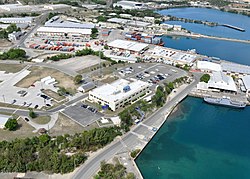User:Luziyca/Sandbox2
| Camp Devon | |
|---|---|
Campo Devon | |
| Devon, Imagua and the Assimas | |
 Naval headquarters | |
| File:Devon seal.png | |
| Type | Military base |
| Site information | |
| Controlled by | |
| Site history | |
| Built | 1968 |
| Built by | |
| In use | 1968-present |
| Battles/wars | TBD |
| Garrison information | |
| Current commander | Willem McDonnail |
Camp Devon (Etrurian: Campo Devon), commonly referred to as Devon, is a military base operated by Halland on the territory of the Assimas Parish in Imagua and the Assimas. Established as a base in 1968 to help strengthen the presence of Hallandic Arucian Command on the Assimas Islands, it is operated by the Commonwealth Marines.
It is today bordered to the east by the municipality of Mennone, to the south by Mosconi, to the west by Rosso, and to the north by Chiumento.
Etymology
(TBC)
History
Origins
Prior to the construction of Camp Devon, it was part of the four municipalities of Mennone, Mosconi, Rosso, and Chiumento.
After the Tripartite Agreement was signed between the governments of Estmere, Halland, and Imagua and the Assimas, Halland expressed an interest in opening bases outside Mordred Naval Base. Thus, in 1958, Imagua and Halland signed an agreement, which allowed Halland to operate bases across the rest of the country, in exchange for Imagua paying the costs to construct the bases and other military facilities.
Construction
After the agreement was ratified by both states, the Imaguan government expropriated the land that would make up Camp Devon in 1960, compensating the owners of the expropriated lands with 5,000 shillings (in 2020 shillings, 403,980ſ57, or €53,672.95). The following year, construction began on Camp Devon.
(TBC)
Contemporary era
(TBC)
Units and commands
Resident units
Assigned units
Geography
TBD
Climate
Climatically, like the rest of Imagua and the Assimas, Camp Devon experiences a tropical monsoon climate, with the yearly average highs being 32 °C (89.6 °F), and the yearly average lows being 20.5 °C (68.9 °F). The wet season is generally from May to October, while the dry season typically lasts from November to April, although the months of April and November receive more rain than any other month in the dry season.
The highest recorded temperature at Camp Devon was at 35.9 °C (96.7 °F) on 1 August, 1939, while the coldest recorded temperature at Camp Devon was at 12.7 °C (54.9 °C), on 15 January, 1911.
Governance
TBD
In addition, military personnel and their dependents, as well as all Hallandic nationals employed on base must follow Hallandian military law, while all other civilians follow Imaguan law. As per the Tripartite Agreement, Hallandic personnel committing crimes against other personnel, or committed crimes against Imaguan civilians in the course of their duties are to be tried by Hallandic court martial, while all other crimes are tried in Imaguan courts.
Demographics
As of the 2015 census, Camp Devon has a population of TBD people. Most of the inhabitants are Commonwealth Navy personnel and their dependents, with the remainder being Hallandic contractors.
Despite the official population of the base, it is accepted by the Ministry of Defense in 2017 that there are several hundred Imaguans who work at Camp Devon, mostly from surrounding villages such as McKinnon and Topuland.
The primary languages spoken at Camp Devon are Estmerish, due to its status as official language of Halland, and Etrurian, as the most dominant language of the Assimas Parish.
Infrastructure
Education
(TBC)
Transportation
(TBC)
Issues
Environmental issues
As environmental laws are far more lax in Imagua than in Halland, the Hallandic Armed Forces has been able to exploit it to... (TBC)
Labour issues
Concerns in the Hallandic Parliament and from NGOs have been raised regarding the labour rights of the civilian contractors for Camp Devon. The locally sourced contractor companies that provide the base with cooking, medical and other secondary services are subject to Imaguan labour law, and thus companies who have received these contracts have taken advantage of it to cut costs. Many workers, which are often of native Imaguan origin, work for salaries severely below average when compared to the same function in Halland or even other Hallandic military bases abroad.
(TBC)
